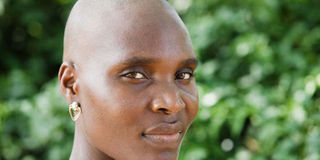Breaking News: At least 10 feared to have drowned in Makueni river
What they don’t tell you about life after cancer

One devastating consequence of cancer treatment is sexual dysfunction. The disease or its treatment alters body appearance. Hair may fall off and a lot of body weight may be lost. An originally energetic person gets frail and may lose the natural glow on their skin. PHOTO | NATION
What you need to know:
- The disease or its treatment alters body appearance. Hair may fall off and a lot of body weight may be lost. An originally energetic person gets frail and may lose the natural glow on their skin.
- All these coupled with prolonged illness can be repulsive to the cancer patient’s partner and intimacy naturally dies off.
Not too many weeks ago, a tall, elegantly-dressed woman walked into the sexology clinic. She looked uneasy.
“I’m Betty and I am not sure I’m in the right place; I need a sexologist,” she said, avoiding eye contact while fiddling with her long fingers with varnished artificial nails. I signalled her to sit and made comments about the crazy weather to break the ice. She wasn’t interested in small talk and went straight to her reason for consultation.
Betty had been given a two-week quit notice by her husband. The man had decided to end the marriage and because the house where they lived belonged to him, Betty had been asked to look for alternative accommodation. That sounded cruel, but I urged her on.
“Well, sex is no longer possible between us,” Betty explained, “I have no desire for it and when he forces me I suffer pain. He says he cannot live with a woman and not have sex.”
CHANGED APPEARANCE
Betty wanted a quick fix.
“If I can prove in these two weeks that I can play my part, he is likely to change his mind and my marriage will be salvaged,” she explained.
Betty was a cancer survivor, having been treated for cervical cancer five years before. Treatment included surgery to remove her uterus followed by radiotherapy. Her sex problems started thereafter.
With advancement in cancer care, many people are living long after treatment. Despite these positive developments, survivors are faced with numerous challenges which they have no idea how to handle. One devastating consequence of cancer treatment is sexual dysfunction. It is estimated that up to 80 per cent of cancer survivors may suffer sexual dysfunction, but unfortunately, doctors involved in cancer treatment never discuss this side effect.
The disease or its treatment alters body appearance. Hair may fall off and a lot of body weight may be lost. An originally energetic person gets frail and may lose the natural glow on their skin. All these coupled with prolonged illness can be repulsive to the cancer patient’s partner and intimacy naturally dies off.
Unless the relationship is strong and well-grounded, the partner may get into an affair or ask for a divorce.
This is why the Ministry of Health needs to urgently roll out guidelines for rehabilitating cancer survivors. This is currently lacking. The guidelines should discuss advice given to the survivor on sexuality, including how the disease will impact her appearance, intimacy, sexual performance and relationship. The cancer survivor should undergo counselling together with her spouse. In some cases sex therapy or sex coaching is necessary.
Betty and her husband lacked knowledge to help them manage their sexuality after cancer and divorce seemed like the reasonable way out.
Following this first encounter, the couple was booked for counselling and sex coaching. They had to relearn how to manage their intimacy and sexuality. It took six sessions in a span of one month to rebuild the intimacy and the relationship.





